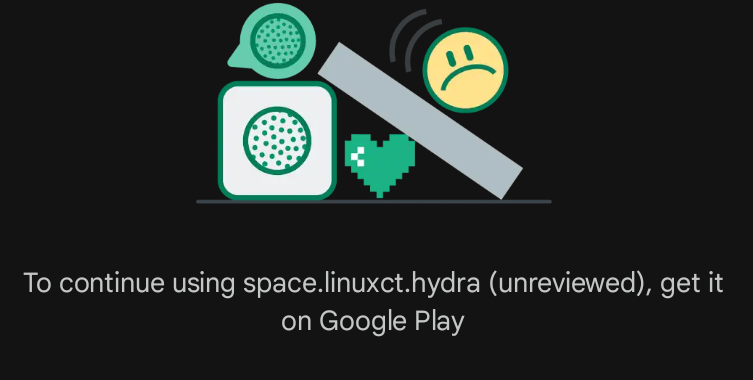- cross-posted to:
- [email protected]
- [email protected]
- [email protected]
- cross-posted to:
- [email protected]
- [email protected]
- [email protected]
You might sideload an Android app, or manually install its APK package, if you’re using a custom version of Android that doesn’t include Google’s Play Store. Alternately, the app might be experimental, under development, or perhaps no longer maintained and offered by its developer. Until now, the existence of sideload-ready APKs on the web was something that seemed to be tolerated, if warned against, by Google.
This quiet standstill is being shaken up by a new feature in Google’s Play Integrity API. As reported by Android Authority, developer tools to push “remediation” dialogs during sideloading debuted at Google’s I/O conference in May, have begun showing up on users’ phones. Sideloaders of apps from the British shop Tesco, fandom app BeyBlade X, and ChatGPT have reported “Get this app from Play” prompts, which cannot be worked around. An Android gaming handheld user encountered a similarly worded prompt from Diablo Immortal on their device three months ago.
Google’s Play Integrity API is how apps have previously blocked access when loaded onto phones that are in some way modified from a stock OS with all Google Play integrations intact. Recently, a popular two-factor authentication app blocked access on rooted phones, including the security-minded GrapheneOS. Apps can call the Play Integrity API and get back an “integrity verdict,” relaying if the phone has a “trustworthy” software environment, has Google Play Protect enabled, and passes other software checks.
Graphene has questioned the veracity of Google’s Integrity API and SafetyNet Attestation systems, recommending instead standard Android hardware attestation. Rahman notes that apps do not have to take an all-or-nothing approach to integrity checking. Rather than block installation entirely, apps could call on the API only during sensitive actions, issuing a warning there. But not having a Play Store connection can also deprive developers of metrics, allow for installation on incompatible devices (and resulting bad reviews), and, of course, open the door to paid app piracy.
Ew. Fuck google
I hate having to be on the side of “Defending” google… but this is the app makers fault, They are the ones using whats provided and installing the artificial limitations.
Google just provided the capability to do it. The app makers are executing it.
No, thanks for the clarification. I misunderstood that part.
This explains why I couldn’t install retroarch on the GalaxyS24 Ultra of a friend via apk or google play store. Would not work, but somehow the Galaxy store version worked….
which cannot be worked around.
Well, at least not without root lol
Root detecting apps to Side loading detecting apps:
First time?
“root access is used to bypass security measures!!! We will make it harder to root your phones to keep your data safe” – Google
I installed FakeStore and set the app’s relevant
/data/system/packages.xmlproperties from Aurora Store to FakeStore (installer="com.android.vending" packageSource="0" installInitiator="com.android.vending", the same as Google Play Store) and rebooted, which was enough to fool the public transport app I’m using. Is this the workaround you’re talking about, or does it require MicroG too?Yea that sounds about right, really hiding root is straight up magic as is (even though it’s a cat and mouse game lol) and achieving that is 98% of the hard work of hiding the fact an app has been sideloaded. Short of a complete overhaul from Google where they actually try that is.
Which, if I’m being honest, doesn’t seem like they are. It seems like a rather simple system all things considered. There’s no Playstore specific keys or signatures or file checks or hashs as far as I can tell. Its just a flag and checking if Playstore exists on the device at all
This is stupid. I will dig further into the real impact to Graphene.
Lucky Patcher?
This seems like a brilliant feature to roll out as they’re getting investigated by the DOJ for being a monopoly.
Google : “You don’t own your phone, we own you.”
Also, didn’t the EU declare that Apple needs to allow other app stores on their devices?
This seems like a bonehead move all around…
In this case, it seems like it’s the app makers themselves who are requiring the Play Store, though. Unless I’m misreading this, the developers are using the Integrity API to determine if the app was installed through “official channels” (in this case, the Play Store). Feels like people should be upset at the companies behind the apps, here.
Okay. Then either use older backup versions of those apps before the requirement of the Play Store, or just quit using those apps and services and switch to less enshittified apps and services.
Easier said than done these days, I know…
everyone wants to be like apple
Android already has other apps stores, like F-Droid.
Yes, I know. The point is that people seeking privacy eventually won’t be able to use their banking apps and other online financial accounts unless they’re signed into Google Play to ‘authenticate’ the app.
AKA force you into letting them steal more of your private info…
I kinda understand it from the bank’s perspective… They need to reduce risk which is why a lot of banking apps check if the phone is rooted (if it’s rooted, how can you be sure that a malicious app with root access isn’t patching the app in memory and redirecting transfers to a different account?)
Having said that, I really don’t think they need to restrict it such that the app can only be installed through the Play store, as long as the app is properly signed and uses certificate pinning to prevent MitM attacks.
Fidelity apps doesn’t require any of this shite?
But some shiti cash-app does?
I wonder why 🤔
This has almost nothing to do with Google, it’s a feature that has to be enabled by the app developer. Meaning they want to exclude users getting the APK for their app from elsewhere.
Kinda. It might be 3rd parties using it but it is 100% an API designed by Google to keep apps on Google Play.
For all we know it could have been requested years ago by developers who have apps that get pirated but there was no mechanism in place to implement it at the time, and wasn’t a priority.
Just because it’s beneficial to Google maintaining more direct control now, that doesn’t necessarily mean that’s the origin.
If an app gets pirated they’re going to have thrown out this check too.
Well, there is a separate system for pirating prevention, the Google Play license check. That has existed for years.
I unironically think so. It offloads the blame onto individual app developers. Google can turn around and say oh well it’s what the market wants
Well that fucking sucks
Google Pain Services. Google Pisses Itself API.
If the Play Store becomes required like that then Android’s already-shaky status as an open source base platform is going to go out the window. I’m glad there are non-Google distros of Android but there really needs to be more of a push to make a completely FOSS phone platform.
There are Linux mobile operating systems like PostmarketOS, but they are too early in development to be used by most people.
Murena phones look promising. And you can download their e/OS if you want to flash the phone you have, provided it’s supported. https://murena.com
The more I think about it, this may finally convince me to…shudders…switch to an iPhone. I’ve always stayed on Android because despite the recent Google bullshit, it still for the most part lets me do whatever. Side-loading apks is a huge part of that.
If it’s turning into a shittier iOS clone, what’s the point?
Can you side load on ios?
Seems like the kind of thing they wouldn’t want you to do?
Don’t do IOS, it’s such a pain. It took us 2 days to figure out how to play an audio book file that I was able to download an F-droid app for and play in like 3 minutes.
Yup that sounds about right for iOS.
Meant more that if Android ends up in the same boat (and by the looks of it, that’s exactly what Google and Samsung want), then iOS starts to look viable because the situation becomes: all the same bullshit but iOS is polished to a shine.
Don’t plan on switching phones until my less than year old Note 9 kicks the bucket 😅
Seems stupid of them to crackdown on sideloading given their recent and ongoing monopoly spanking.
There are Linux phones available. I,m going to guess popularity of those devices to increase soon.
Sadly the only people who would switch over to an actual Linux phone would be the people like the stereotypical Linux using Lemmy user. The average android user would just continue on like nothing happened because they’re not tech literate enough to know what’s going on or why they should care.
Hey! I bought this android cus Im Tech literate u-u
Though im not one bit familiar with Linux.
I,m going to guess popularity of those devices to increase soon.
I don’t want to be pessimistic about it, however I think it’s gonna be like Windows: enshittification will happen, but inconvenience is “too small” for people that they’ll rather check for a workaround than leave the platform.
My guess is that we need something more appealing like the Steam Deck to make people take the step.
My guess is that we need something more appealing like the Steam Deck to make people take the step.
Hear me out! The Steam Phone®!
Steam’s UI is tolerable, but inconsistent. In a SteamDeck, OK, but in a phone? Idk.
I get that this isn’t meant that seriously.
I’d be happy with 2010 era desktop Linux level of support. It doesn’t need to get everybody to switch, just needs to be good enough for my needs.
But part of the appeal of Linux is the fact that you can repurpose existing computers running other OSes to run Linux instead. This is a great way to lower the barrier to entry for Linux, because it’s easy to test it on a Live USB or a dual boot. It’s much harder to do this on phones because they have locked bootloaders.
Another problem is that phones are not productivity devices - they’re consumption devices. Maybe this is just my personal bias, but I don’t think people will be as passionate about liberating their phones because they’re inherently less useful than computers. Convenient, yes, but useful? Not as much.
That said, I would love to be proven wrong. I would definitely consider a Linux phone if they become more popular/useful, but I can’t really justify spending hundreds of euros/dollars on something for which I don’t see any particular use.
When I say Linux phones, I mean selling a phone with Linux already or Linux ready, not taking existing phones with Android and putting Linux on them.
Examples:
Purism Librem 5
PinePhone Pro
Pro1 X
Volla Phone X23
There aren’t, really. There are a few antiques and half baked things.
A big problem is that these days, unless you’re the size of Apple or Samsung, it’s impossible to get a reasonable hardware soc and modem other than one which only runs a soon obsolete blob laden android which is going to be EOL before you’ve even finished your design.
The hardware is not there. The firmware/hw data/platform isn’t there even to begin OS work with. And there’s a global shipping, regulation and mobile operator hell waiting on the other side. And a product lifecycle that’s only a few years long.
Yes, I’ve worked for phone manufacturers.
That was the hope with Android, too.
The problem is that as the OS is “free” that means it costs less functionally for the device manufacturer to get an OS on the device, so now they can pour more money into bloatware.
Android was supposed to stop bloatware but all it did was enable it.
Even without a forced “store” Linux is prey to the same issue of piecemeal support from various vendors all with in-house solutions that all stink.
At this point, even that would be preferable.
Your right, any open platform will be bastardized eventually, but that doesn’t mean there isn’t still a need for “resets”.
There is no perfect platform for escaping it, because the market forces will always adapt and assimilate. The only true escape is to keep moving.
That’s why it’s important for users to be hermit crabs, and move to the next thing, no matter how janky, because they will at least be able to influence it positively and have a relatively open platform for a number of years. Then the cycle repeats.
If propping up Linux phones will get us the open platform we need, even if only temporarily, we should do it.
The issue I think is that the current trends in all consumer software are increasingly user hostile, and the major platforms are creating ecosystems to support this. It’s become the norm now to be able to directly control the usage of the software on consumer devices. Apple has normalized this, Google and Microsoft followed.
At what point will developers refuse to even create software for a system that doesn’t allow them that control?
Look at how many developers out there absolutely jerk themselves raw at the idea they should be able to compel users to update to continue using their software. Look at how many believe the modern security culture fallacy that handcuffing users and throwing away the key is the only way to protect them.
It’s a development culture issue. Respecting user control of their own device is no longer in vogue.
Linux isn’t even popular on desktop. No way a mobile version becomes popular without some massive shifts in Linux ideology and culture.
You take that back now!
As much as I want that to be the case, I don’t think full mobile gnu+Linux is really ready to use daily?
I haven’t exactly been keeping up with things, mind you
I used it as my daily phone for months, and… well, I’m willing to deal with the problems. Without pretty careful battery management it’s not feasible, and it’s hard to manage your battery given the glitches. I often found my phone dead after a couple hours because it woke the screen immediately after I locked it because… reasons, and then kept it awake until the battery died. The biggest issue aside stuff like that (small issues that cause big problems), the biggest issue was I couldn’t get a map app working. There are some distros with working maps, none for my phone. Also call quality was horrendous. Like. I’m known for being able to tolerate bad quality, but this was, at times, about as bad as I remember my firefly phone being when I was 12, and I could not feasibly understand people at times with that thing.
But the only reason I stopped using it was because the wifi isn’t working on it. Once I get that back up and running I’ll likely switch back to it. As bad as it can be at times, I still feel more comfortable having that as my primary phone than my Android.
Really appreciate the insight
I sub to a few mobile Linux feeds and I want but don’t at all think mobile Linux is ready, even for tech devotees. Too battery hungry, not enough ease of use, missing functions, etc. And that’s not including lack of apps.
Sailfish gets closest so far I think. But yes, not ready. Ubuntu touch last time I tried is fine but still a bit out of sorts.
Yes. I think a huge issue is Linux doesn’t handle other app activities like how Android’s Intent or Broadcast does.
Just a note, one of if not the most popular mobile Linux distro is PostmarketOS, which is not GNU (it’s based on Alpine)
Good to know, that’s not the one I had in mind, however.
For whatever reason I thought PMOS was based on Manjaro. Could be something as silly as associating one green logo with another.
If someone would be buying those, someone would be selling. You have all the opportunity to fork current android, put it on a different platform, make sure all the drivers are open source instead of blobs, and sell it.
I’d really want to buy one. But I’ll only do that after you somehow make sure the 3-5 major messaging apps, 2-3 major browsers, and a really good maps app are available.
So, basically, it’s a 100 mil endeavor for an MVP really. So, I think, the chances of someone actually pulling it off are pretty slim.
It’s not like dedicated people aren’t going to be able to just patch out the calls to this API from the apps themselves…
This feels like yet another attempt at DRM that is doing more harm than help.
Why would that be possible? Wouldn’t the developer have their server rejected any calls from “unsigned” apps?
Possibly, but many apps don’t actually need to phone home to function.
Of course that doesn’t stop developers arbitrarily requiring it.
If functionality exists in the client app, there’s nothing to be done to stop someone from bypassing checks.
Looking into it further this looks like it’s an API between the backend of a service and Google though. That would be difficult to defeat, but you could probably spoof the identity of the requesting device with enough effort
You mean like literally every single attempt at DRM since the Big Bang?
Indeed, I already bypass SafetyNet and Play integrity with some kind of xposed module, I don’t expect this to change.
Whoa, is Xposed still a thing that works? Had to use Magisk instead to get the safety net stuff working on Lineage OS android 11
Xposed is just an API which is provided by the LSPosed Magisk module.
Huh…the more you know. I just assumed Magisk was a spiritual successor, apparently I misunderstood how any of it works.
Can you tell me which modules you use? I am trying to pass SafetyNet on Waydroid but can’t pass even basic integrity.
idk where I got it from, but it’s called “Universal SafetyNet Fix” by kdrag0n
Did you just install the module and passed safetynet or did you have to use custom fingerprint? Also are you on custom or stock rom?
Don’t remember, sorry
Am on e/os/
I’ve used Magisk with the safetynet module + hiding root from apps with like a 95% success rate. Quick search for “magisk safetynet” and look at the xdadevelopers threads
What’s the point of having an android phone then? I fucking hate android so much, but I only use it, not iOS, because of sideloading.
OfIf they take that away from us then why not just get an iPhone then? Our only hope is Linux phones picking up a little.F-Droid
Most of the apps I have and use are installed via Droidify. The ones that aren’t are company apps, like banking or airline. I could just used the web sites for those; they’re only conveniences.
My phone isn’t rooted, and I didn’t read the article so I don’t know how this will affect me. If push comes to shove, I’ll simply bite the bullet and get a phone I can install Linux on next time, regardless of how polished for daily driving it is.
Right on. I do use F-Droid and droidify. I also use Obtanium. Linux phone has never sounded better, godammit. Like you, I really don’t give a shit about those banking apps and other shit, web browsers are more than enough in this day and age.
I would most likely be using a phone with Ubuntu Touch on it as my daily driver if it wasn’t for the fact that the cellular carriers force me to have VoLTE support for calls, which is kind of the point for a phone! And guess the one thing Ubuntu Touch doesn’t have support for!
One reason would be that with an iPhone, you’re paying two to five times the price of an Android phone with comparable hardware.
Hardware isn’t everything. Apple has a couple of advantages over iPhone that let them do more with less:
- iOS needs to support a MUCH fewer devices than Android. Even before they switched to their own silicon, they’ve been optimizing the OS to the hardware really well giving you devices that go toe to toe with Android flagships of the same generation with SIGNIFICANTLY better hardware and like double the RAM. Also why Apple doesn’t really care to increase RAM as much as the android side of things.
- Apple silicon is actually really good and making their own hardware allows them to optimize on both sides of the equation and lets them do more with less.
The selling points for Android (at least the way I’ve seen it over the years) have always been full control (talking about non-root, I’d rather not go down the root rabbit hole here) and (since iPhone 11 started doing firmware blocks on parts) reparability…but both seem to be going out the window lately.
Prices are crap though, but then again Android phones on the top end don’t seem much better. 1-2 gen old iPhones are usually a bit more reasonable though tbh.
I do the same on android, as I have always owned a Samsung Note/Ultra. Only this year have I purchased a OnePlus phone, and I’ll never fucking do it again, I hate this phone so much. Going back to Samsung for sure once the S25 Ultra drops.
This is just Google’s clever way of not removing the sideloading feature from their OS.
They let app developers to prevent users from using sideloaded app.
This way they can avoid antitrust lawsuits.
I have high hopes for apps like lucky patcher and Revanced manager to help us avoid this bullshit
It’s the apps that prevent themselves being sideloaded. Presumably, their devs will enact similar policy on EU iOS too.
Fuck me, it’s like a butterfly effect, every mother fucker now will follow suit.
App developers need ways to know the app has not been modified in unsanctioned manner, glad to see Android finally catching up on security with integrity checks.
Yup, this is important for certain apps with a high security bar. Surprised at all the downvotes.
Slippery slope. Soon it wil be for all fucking mundane apps because they don’t want you running a modded version…which is my fucking choice to do
This is Lemmy. If you’re not advocating for FOSS, or piracy to spite the corporations, you’re gonna get downvoted. I don’t care. We need better security standards whether these kids like it or not.
This does jack-all for security, it’s just monopolization in disguise and you’re buying into it.
Security by default is fine, but not if its being forced.
If I go out of my way to root my phone or sideload an app, I have a reason for that. I’m fine with an app going “Hey! This phone is rooted / this app is not from an official source! Wait 10s before you can click ‘I understand and take full responsibikity in case of a security breach’”.
I’m not OK with an app going “I will not work on this device because yiur environment is non-standard, period”.
certain apps with a high security bar
like the McDonalds app, which already requires workarounds to work on rooted devices?
You want affordable food, you WILL pay them with your data. Always on location please! Oh and precise as well, thank you.
Of course not, sometimes it really is just corpo bs, don’t use their app if it’s such an issue for you.
They can check their own integrity without Play services. And even then, ME AS A USER, doesn’t want the app to decide this for me.
No, this will only lead people without access to Google Play to be forced to get it from somebody who has modified the app to fake the check.
Which obviously sucks but also is exactly what developers want or just don’t care
If they don’t have access to Play, then the developer of that app specifically does not want to service them as a user. Developers have to enable this feature in their own apps for it to do anything. If that developer wanted to support de-Googled users, they wouldn’t enable this in the first place.
It’s my phone. If I’m specifically going out of my way to do that, they have no right to force me to do it their way.
Personally, it’s not Google’s place to dictate how an app verification ecosystem works. If a company has developed an app, they need to be the ones to make sure it’s secure in the first place, not trusting a monopolist tech company that has almost all control with how someone uses their phone.
Google has rules yes, but Android is open-source and should be open with a free & open market for apps. After all, we paid for the device.
Why do you think apps should verify their integrity in the first place? In the case of banking apps or other online apps, the APIs they use should be secure in the first place so a user can’t achieve anything meaningful by modifying API calls. In the case of offline games with monetization, a hacker who makes a pirated APK will also remove the restriction so legitimate players on non standart ROMs will get screwed. In the case of messaging apps with a “delete messages” or “one time view” function ie. Whatsapp, the sender shouldn’t take that their actions will be respected by other clients because modded apps exist and Whatsapp doesn’t care if you install it on a rooted device.
This!
APK signatures exist and they’re enough for making sure the file you got isn’t modified. Warning people when they use apks for stuff like banking, I get, but if they wanna take the risk, it’s on them.
Blocking root makes no sense because I’d argue that if the person knows enough to root their phone and got past all those bricked phone/thermonuclear war warnings, the onus is on them to not get their keychain compromised by giving root to some random app. Again, a warning is fine.
Aside from that, people need to understand: THE CLIENT IS NEVER SECURE. NO EXCEPTIONS.
Any self respecting secure API is made under the assumption that all the calls are coming from some malicious state actor using
curluntil proven beyond doubt that it’s an actual user.API are secure only if you can secure the authentication details. A modified app (be it as something modified and distributed on a unsanctioned channel, or custom injected by another malicious actor/app) can easily siphon out your authentication tokens to a third party unbeknownst to you the user. However, if the app verifies it came from the approved source and have not been tempered with, then it is much easier to lean on ASLR and other OS level security to make it harder to extract the authentication info.
Multiplayer game operators have obligation to curb modified clients so their actual paying clients have a levelled playing field. By ensuring their apps are only distributed via approved channels and unmodified by malicious players, this improves their odds at warding off cheaters creating a bad time for those that actually pay them to play fairly.
These are just simple cases where this kind of security is beneficial. I am glad Android is finally catching up in this regard.
be it as something modified and distributed on a unsanctioned channel
Downloading APKs from reputable sources and signature checking can help with this one. Android will refuse to upgrade an app if APK has a different signature anyways.
custom injected by another malicious actor/app
If this is possible there are bigger problems.
Multiplayer game operators have obligation to curb modified clients so their actual paying clients have a levelled playing field.
There isn’t much I can say for that.
I just won’t use any apps that do this. Simple.
Good luck when banking apps start doing this.
personally, i wouldn’t trust a third-party created app with my banking details. what’s more, i’ve removed all banking apps from my phone.
i don’t need to allow access to my finances on the device which is most likely to get pinched out of everything i own. plus google and apple don’t need to know which banks have accounts of mine.
imo that additional inconvenience to conduct all banking transactions from a browser is worth the candle.
Oh shit…
Can’t give up the fight just because you want convenience.
I’ll be real, I wouldn’t trust a banking app from any third-party storefront to begin with. That’s the sort of app I’d really want to be properly vetted and secured.
When did Google start verifying security on play?
Play Protect has been around for a few years now and will disable apps it detects that are abusing user data.
My point is, it doesn’t do much, if anything.
deleted by creator
aww man is that still a thing ( as in working )
But, there’s no difference in security between using a different storefront? The difference in security depends on the app itself, not where it was downloaded from.
Assuming the app is legitimate, sure. But unless you can verify the code, yourself, then you’re having to trust that the source you download from hasn’t altered the APK in some way. That’s a pretty big risk for most people when it comes to finance apps.
APKs are signed, you can verify the integrity of an APK. If you have a previous version of an app installed, a new version with incorrect signature won’t even install.
Yeah but I mean if your bank would offer their app through F-Droid as an addition to Google Play, there is no reason to assume the app suddenly got less secure because of that.
If you’re using a custom de-googled rom you don’t have the play store, so this would just gut that functionality :/ same for any other app that decides they need this, which if the past is anything to go on is going to be a ton of apps that really don’t need it
Do we really need banking apps? Fuck it I’ll use their website.
The features you miss out on would be direct deposit from checks and app notifications (usually there are a few that you want enabled but are only available through the app).
Most banks I’ve used allow SMS notifications for things like deposits and purchases.
The check things is true but I need to use it like less than once a year so eh.
There’s an app to make web apps icons. Or just use Firefox to add the bookmark to your homepage
Some places are ditching the website and going app-only. Stockpile as an example.
Cash. No app part. Just cash.
Yeah until the cops pull you over and take your cash under civil asset forfeiture because it’s “suspicious that you have so much cash on hand”.
I knew a dev once that absolutely refused to use banks. I’m a populated California city. With security cameras all over outside, everywhere. Buried cash in Mason jars. We lost touch but I always wondered how that worked out.
There’s no way my broke ass would ever have that much cash.
I already have to do this. My office wants everyone to use the MS authenticator app, won’t run on LineageOS. Even if it did, I wouldn’t install it, but still.
Ended up making them purchase a hardware security key for me instead.
I’m pretty new to this sort of stuff. I was planning to buy Google Pixel 8 sometime in November when they usually have sales. And install GrapheneOS. I never used this type of stuff before.
So will I have some trouble installing some stuff like some of mobile games, banking app, emails, etc? I’m in Canada if this help.
The EU is going to be furious about this
I hope so. I don’t want Android to become the new Apple
Nah, I doubt it. The app developers are freely adding this themselves.
The EU should limit Google giving developers this ability is what they mean
I also dislike DRM but I don’t think it makes any sense to make it illegal.































